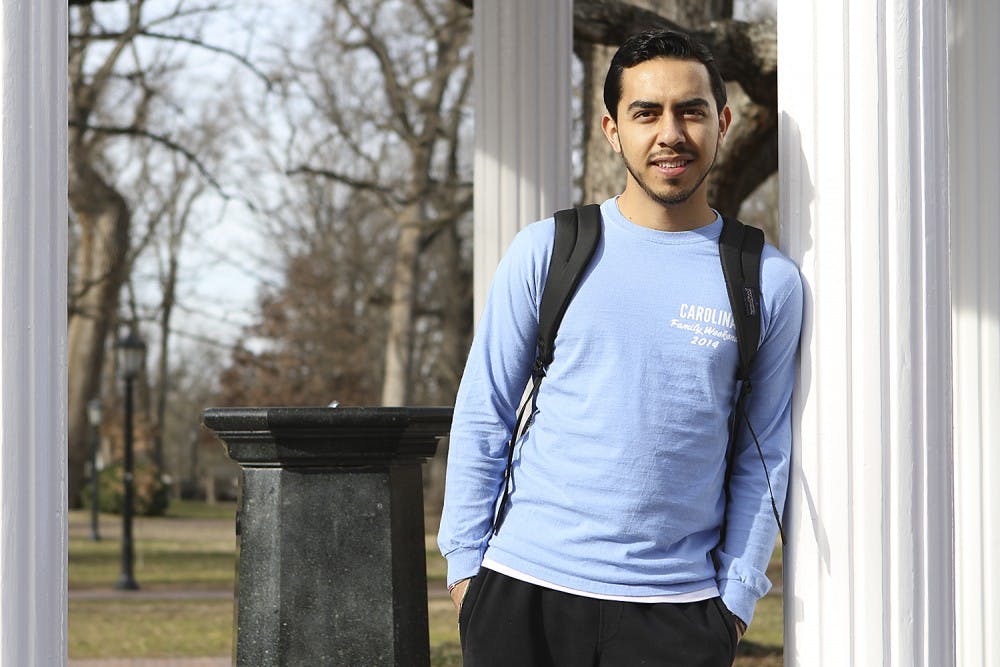Even if an undocumented student graduates high school, college is usually cost-prohibitive, said journalism professor Paul Cuadros, who is the executive director of Scholars’ Latino Initiative, a student organization for mentoring Latino youth. Under federal law, illegal immigrants can not be granted in-state university tuition or federal aid.
“They essentially have no avenue to pay for their college education except out of pocket.”
Ron Woodard, director of the immigration reform organization N.C. Listen, said undocumented immigrants who attend college displace legal citizens.
“Where is the concern for the American citizen in all of this? All I hear about is concern for the so-called ‘dreamers.’ American citizens have dreams too,” he said.
Larry Shaheen, Jr., a Republican political consultant based in Charlotte, said the state constitution guarantees citizens the right to a college education as free as is practical. He said any tax-paying resident who has lived in the state for more than a year should be considered a citizen.
“The United States was built on immigration,” he said. “The Republican party needs to do a better job at some point of ... dealing with reality.”
National and state policies
Jose said UNC was his dream school. It was the only public university he applied to because he knew private scholarships were his only chance at affording college.
“We’re a working class family,” he said. “It was really up to me to find resources.”
Jose was lucky enough to be awarded a full-ride merit scholarship through a national program called Golden Doors. Now a sophomore, Jose is involved in the dance group Chalkaa and is a mentor for the Scholars’ Latino Initiative.
“(UNC) is definitely as great as I expected,” he said.
But he still has more odds to beat.
To get the day's news and headlines in your inbox each morning, sign up for our email newsletters.
Of the first-generation students who entered UNC in 2008, just 72 percent graduated in four years, compared to 83 percent of students with at least one parent with a college degree.
For U.S. citizens who entered UNC in 2011, 91 percent returned for a fourth fall semester, while about 80 percent of undocumented students in the same class returned for their fourth fall semester.
Cuadros said undocumented students carry an added burden of staying up-to-date on immigration laws.
“For many of the students, keeping track of what’s happening with federal policy is always on their minds,” Cuadros said.
Jose said he worried about changing laws and his immigration status a lot during his first year. Now he’s more comfortable with his place at UNC, especially because of the 2012 Deferred Action for Childhood Arrivals program. DACA allows people whose parents brought them into the country illegally to be temporarily protected from deportation.
For those not protected by DACA, deportation is a threat that causes worry for themselves and for the sake of their family members.
“That creates incredible strain,” said UNC law school professor Deborah Weissman, an immigration expert. “It’s a lot to put on young people who are here in most instances through no choice of their own.”
Weissman said she hopes for the N.C. legislature to pass laws in favor of tuition equity but doesn’t expect it to happen in the near future.
“If you’d asked me a year ago if I thought there would be holistic immigration reform, I’d have said yes,” she said.
But the grassroots efforts, such as the One State, One Rate campaign led by immigration activist and UNC student Emilio Vicente, seem to have lost their momentum.
“People get caught up in what’s happening on a national level,” Weissman said. “It’s possible that local campaigns are having to take in what’s happening nationally and regroup.”
Shaheen said the legislature won’t act on immigration because it’s in Republican control.
“They just don’t feel it’s a pressing issue,” he said. “At this point immigration is viewed as a federal issue.”
Trend toward tuition equality
Ashley Memory, senior assistant director of admissions at UNC, said in an email that state law prohibits UNC from requiring a Social Security number on applications. Students without a social security number must be considered an out-of-state applicant, she said.
Financial aid complicates things.
The Morehead-Cain Scholarship Program, which offers a full ride, does not grant scholarships to undocumented students.
Allen Chan, executive director of the Robertson Scholars Leadership Program — a collaborative full-ride scholarship program between UNC and Duke University — said in an email the Robertson does not have a policy for undocumented students.
“We cannot award the Robertson unless they are admitted to either Duke or UNC,” he said. “This is subject to the administrations and admissions groups at both universities.”
But undocumented students might see some financial relief in the future.
The national trend is in favor of allowing in-state tuition for undocumented immigrants who attended high school in their respective state, said Tanya Broder, senior attorney at the National Immigration Law Center.
“We see this in blue states and red states and purple states, across the political spectrum,” she said.
She said DACA helps undocumented students succeed in school by helping them get better jobs to pay for college. And the more immigrants who are allowed to attend college, the more legislators will see positive benefits for communities, she said.
Cuadros said because Latino students are one of the fastest-growing demographics in North Carolina’s population, the state and its universities should be prepared to help Latino students attend and graduate college.
“We’ve invested a lot of time and effort and money into educating these young people,” he said. “When we deny young people the chance to achieve bigger and better things through higher education, we’re really not getting a return on our investment. And we could.”
special.projects@dailytarheel.com



